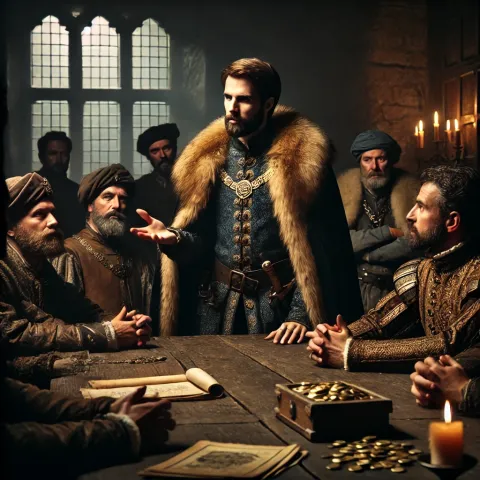
To repair the shattered meshes of his web, than did Waldemar Fitzurse to reunite and combine the scattered members of Prince John’s cabal. Few of these were attached to him from inclination, and none from personal regard. It was therefore necessary, that Fitzurse should open to them new prospects of advantage, and remind them of those which they at present enjoyed. To the young and wild nobles, he held out the prospect of unpunished license and uncontrolled revelry; to the ambitious, that of power, and to the covetous, that of increased wealth and extended domains. The leaders of the mercenaries received a donation in gold; an argument the most persuasive to their minds, and without which all others would have proved in vain. Promises were still more liberally distributed than money by this active agent; and, in fine, nothing was left undone that could determine the wavering, or animate the disheartened. The return of King Richard he spoke of as an event altogether beyond the reach of probability; yet, when he observed, from the doubtful looks and uncertain answers which he received, that this was the apprehension by which the minds of his accomplices were most haunted, he boldly treated that event, should it really take place, as one which ought not to alter their political calculations.
“If Richard returns,” said Fitzurse, “he returns to enrich his needy and impoverished crusaders at the expense of those who did not follow him to the Holy Land. He returns to call to a fearful reckoning, those who, during his absence, have done aught that can be construed offence or encroachment upon either the laws of the land or the privileges of the crown. He returns to avenge upon the Orders of the Temple and the Hospital, the preference which they showed to Philip of France during the wars in the Holy Land. He returns, in fine, to punish as a rebel every adherent of his brother Prince John. Are ye afraid of his power?” continued the artful confident of that Prince, “we acknowledge him a strong and valiant knight; but these are not the days of King Arthur, when a champion could encounter an army. If Richard indeed comes back, it must be alone,—unfollowed—unfriended. The bones of his gallant army have whitened the sands of Palestine. The few of his followers who have returned have straggled hither like this Wilfred of Ivanhoe, beggared and broken men.—And what talk ye of Richard’s right of birth?” he proceeded, in answer to those who objected scruples on that head. “Is Richard’s title of primogeniture more decidedly certain than that of Duke Robert of Normandy, the Conqueror’s eldest son? And yet William the Red, and Henry, his second and third brothers, were successively preferred to him by the voice of the nation, Robert had every merit which can be pleaded for Richard; he was a bold knight, a good leader, generous to his friends and to the church, and, to crown the whole, a crusader and a conqueror of the Holy Sepulchre; and yet he died a blind and miserable prisoner in the Castle of Cardiff, because he opposed himself to the will of the people, who chose that he should not rule over them. It is our right,” he said, “to choose from the blood royal the prince who is best qualified to hold the supreme power—that is,” said he, correcting himself, “him whose election will best promote the interests of the nobility. In personal qualifications,” he added, “it was possible that Prince John might be inferior to his brother Richard; but when it was considered that the latter returned with the sword of vengeance in his hand, while the former held out rewards, immunities, privileges, wealth, and honours, it could not be doubted which was the king whom in wisdom the nobility were called on to support.”